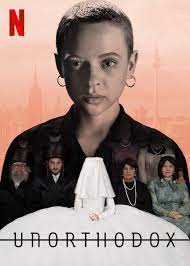
UNORTHODOX
US/Germany, 2020, 4X 55 minutes, Colour.
Shira Haas, Amit Rahav, Jeff Willbusch.
Directed by Maria Schrader.
Unorthodox is a four-part miniseries, filmed in New York and Berlin, principally in Yiddish. It is based on the biography by Deborah Feldman, Unorthodox, The Scandalous Rejection of My Hasidic Roots. It was very well received, nominated for many enemies, winning one for the Dir, Maria Schrader.
The central character is a young bride in the Sitmar group, originating from Hungary, of the ultra-Orthodox in Brooklyn. She lives a very sheltered life, dominated by her family, especially the older women. The women are sheltered in the community, even to cutting and covering their hair. She becomes betrothed to an earnest young man and marries him, finding the marriage and her life and fulfilling.
She escapes, goes to find her mother who had been rejected by the community and who now lives in Berlin. In Berlin she encounters a group of musicians, finds lodgings with them, some training, singing, some criticism within the group, in encounter with one of the members of the group.
In the meantime, her husband employs the help of his cousin, a man who had fled the community but has now returned and is zealous. He tracks down the wife in Berlin, confronts her, but she asserts her independence.
Israeli actress Shira Haas makes a strong impression as the wife.
- Based on a true story? New York, the world of the Orthodox Jews, ultra-Orthodox? Williamsburg? The contrast with Berlin?
- The women’s story, authentic, the writer of the original book, the perspectives of the director and producers, screenwriters? Performance? Women in Orthodox Jewish society, in New York City? This silent presence? Singing, the Talmud, the traditions? The presentation of New York City, Williamsburg, the streets, homes, the synagogue, interiors? The sets, decor and costumes? Stylised? The wedding? The authentic feel and detail?
- The contrast with Berlin, city, apartments, streets, theatre? The feel of the city, modern, the 21st-century?
- The intercutting of the stories, the present in the past, New York in Berlin? The dramatic effect?
- Esty’s story, her marriage to Yanky, her mother and the older generations, the women and their status, silent? The flashbacks to the courtship, the wedding, clothes, hair, head covered? The influence of the elders, the grandmother, the aunt? The women having no active part in society, wives and mothers?
- Esty’s mother, the past, departure, moving to Berlin, her work, her relationships? Providing the identity for Esty, Esty’s decision to leave, going to Berlin, her mother, the eventual meeting, her mother supporting her?
- The glimpse of the marriage, Yanky, earnest, the traditions? His upset at Esty’s leaving? His discussion with Moishe?
- Moishe, the rebel, wanting to restore order, his plan, going to Berlin, Yanky, the experiences in Berlin? Tracking down Esty?
- Esty, immersed in the Berlin world, meeting the people, music, her performance, acceptance, the training, the woman and her critique? Adapting to the new world? Friendship, sexual relationship? Adjusting?
- Moishe, Yanky, the meetings with Esty? Her decision to stay?
- The film as a portrayal as well as critique of ultraorthodox Judaism? And the subjugation of women?